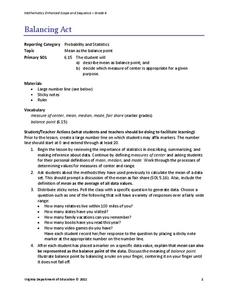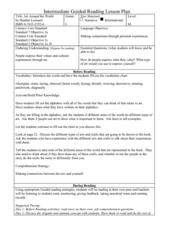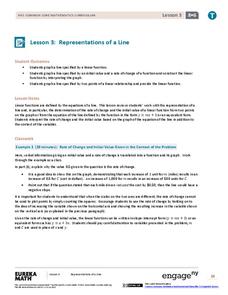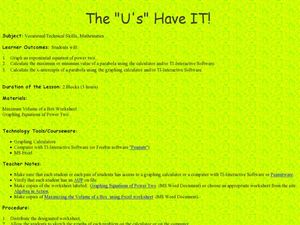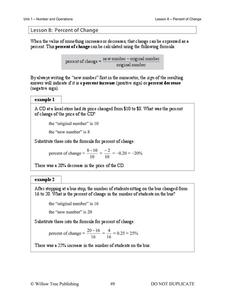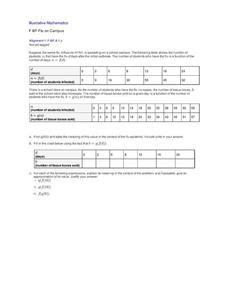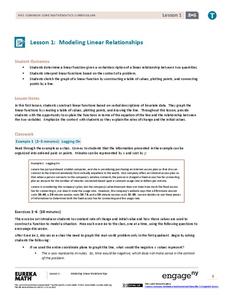Willow Tree
Extremes, Range, and Quartiles
The middle of the data is important, but what about the rest of it? The lesson shows learners the importance of the range, quartiles, and extreme values. Pupils practice finding each of these values from given data sets.
Virginia Department of Education
Balancing Act
How many different interpretations of the mean are there? Scholars place numbers on a number line and determine the mean. They interpret the mean as the average value and as the balance point.
Curated OER
Latitude
Your young geologists generate a graph given a table of values from the context of latitude and percent of the earth's surface north of that latitude. The questions in the activity then focus the learners to a deeper understanding of the...
Curated OER
You Can Count on Spelling
Here is a cross-curricular activity that is suitable for virtually any grade level! Learners calculate the mathematical value of their spelling words using the letter tiles from a Scrabble game and identify the spelling word with the...
Curated OER
Art Around the World
The non-fiction book Art Around the World by Heather Leonard serves as inspiration for learning how art reflects cultures and values. New vocabulary and background knowledge are fleshed out before reading the story. Afterward, the class...
EngageNY
Representations of a Line
Explore how to graph lines from different pieces of information. Scholars learn to graph linear functions when given an equation, given two points that satisfy the function, and when given the initial value and rate of change. They solve...
Curated OER
Bouncing Ball
Students collect height versus time data of a bouncing ball using the CBR 2™ data collection device. Using a quadratic equation they graph scatter plots, graph and interpret a quadratic function, apply the vertex form of a quadratic...
Curated OER
The "U's" Have IT!
Young scholars explore the maximum and minimum values of parabola. In this exponential equations lesson plan, students use graphing calculators or TI Interactive Software to calculate values of parabola and graph x-intercepts of parabola.
Curated OER
Using Plant Pigments to Link a Suspect to a Crime
Students use chromatography to separate plant pigments collected from a fictitious crime scene and suspects. They compare the Rf values of the plant pigments to determine whether the plant pigments found on any of the suspects match the...
Curated OER
Equal Differences Over Equal Intervals 2
Your algebra learners explore linear functions concretely using tables of values in a collaborative task. The idea that linear function values change by equal differences over equal intervals, is emphasized. The slope and...
Curated OER
Self-Portraits
Eighth graders create self-portrait showing value and emotion, and gather information about color and emotion through different handheld applications.
Willow Tree
Percent of Change
Your car decreases in value from $20,000 to $17,000. What percent of the value have you lost? Pupils answer word problems by determining the percent of change.
EngageNY
Addition and Subtraction Formulas 2
Knowing the addition formulas allows for the calculations of double and half formulas. The fourth installment of 16 has the class use the addition formula to develop the double angle trigonometric formulas. Using the double formula,...
EngageNY
Find Solutions to Make Equations True
The truth is always best. Individuals continue to find values that make equations true in the 26th installment of the 36-part module. The only difference is that they now call them solutions to those equations.
Illustrative Mathematics
Flu on Campus
An outbreak of the swine flu on a school campus has caused an increase in the number of boxes of tissues sold by the school store. In a real-world-modeling activity, pupils use composition of functions to determine how the number of...
CPM
Direct, Joint, and Inverse Variation
Here is a quick guide to direct, joint, and inverse variation used in realistic situations. Each topic has a page of notes and examples followed by practice problems. The resource explains each type of variation and provides their...
Curated OER
Goody Bags
Looking for Common Core math center ideas for your Kindergartners? This a great one that is easy to set up, change up, and can be individualized to the learning level of each child. Start with a collection of zippered plastic bags...
Curated OER
China's 'One Child Policy'
Students use an extract from Beth Gilligan's Voices and Values: Citizenship in Asia (Curriculum Corporation, 1998, pp 29-30), together with other resources, as the basis for investigation and analysis of China's 'one child policy'.
Curated OER
Nutrition
Fourth graders identify food groups, foods that fit into those groups, and look at the nutritional value of each food group. They also discover how to interpret and understand food labels. The whole class makes some burgers and fries,...
EngageNY
Percent Rate of Change
If mathematicians know the secret to compound interest, why aren't more of them rich? Young mathematicians explore compound interest with exponential functions in the twenty-seventh installment of a 35-part module. They calculate future...
EngageNY
Graphing Cubic, Square Root, and Cube Root Functions
Is there a relationship between powers and roots? Here is a lesson that asks individuals to examine the graphical relationship. Pupils create a table of values and then graph a square root and quadratic equation. They repeat the process...
EngageNY
Addition and Subtraction Formulas 1
Show budding mathematicans how to find the sine of pi over 12. The third instructional activity in a series of 16 introduces the addition and subtraction formulas for trigonometric functions. Class members derive the formulas using...
EngageNY
Modeling Linear Relationships
Math modeling is made easy with the first installment of a 16-part module that teaches pupils to model real-world situations as linear relationships. They create graphs, tables of values, and equations given verbal descriptions.
EngageNY
Estimating Digits in a Quotient
Boiling down any division problem to a one-digit divisor problem sure makes estimation easy. The lesson shows how to estimate division problems by using place value understanding and basic arithmetic facts to simplify the division. Some...
Other popular searches
- Music Note Values
- Beginning Music Note Values
- Musical Note Values
- Rhythm & Note Values
- Teaching Note Values
- Note Values in Music
- Learning Note Values
- Note Values Worksheet
- Sixteenth Note Values
- Reading Music Note Values
- Note Values and Rhythm
- Dotted Note Values

